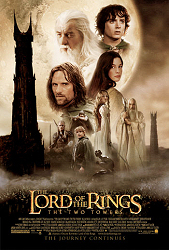
7 Star Warsesque
Essays
VI. Star Wars vs. The Lord of the Rings
| This is the sixth informal essay taking a critical approach to topics relating to the Star Wars universe. Written late in 2002, marking the only time that both a Star Wars film (Attack of the Clones) and a Lord of the Rings film (The Two Towers) would ever screen in the same year, a comparison between the two series was predictable and likely unavoidable. Written late that same year, this analysis largely addresses some of the complaints and hostility directed toward the Star Wars prequels, especially in relation to the old-but-new-again fantasy series.... |
While my reaction to Fellowship of the Ring was a sort of rational and distanced appreciation – well-made and intelligent, despite an unjustly anticlimactic ending – I fell in utter love with The Two Towers. It was like watching Star Wars for the first time as a kid again, just really great.
 I
am not convinced, however, that the comparison can ever be fair between Lord of
the Rings and the new Star Wars prequels. One of the thrills of
I
am not convinced, however, that the comparison can ever be fair between Lord of
the Rings and the new Star Wars prequels. One of the thrills of I won't dispute the choice to make Star Wars prequels. They exist, and they've been fun. But I do not think the public at large will ever consider them better than the original Star Wars trilogy or the Lord of the Rings series due to a widely-held and unjust perception of the prequels’ lack of originality. When adults begged Lucas to make another Star Wars, I think what they were really asking for was for him to make them feel like they did when they first saw Star Wars movies, i.e. to make a new, fresh epic. But in our impatience, we failed to analyze this desire and simply said, "Star Wars! Star Wars made us feel this way! More Star Wars!" and "Lucas! Who better to make a new Star Wars than Lucas, the maker of Star Wars?" …The answer is now perhaps obvious.
The Matrix gave it its best shot, but Lord of the Rings is the new Star Wars. The prequels could never be Lord of the Rings, which is to say, could never be the original Star Wars trilogy, because that particular manifestation of the, shall we say, “epic story” archetype already existed—the original Star Wars trilogy. Going into the prequels, each first-generation Star Wars fan knows not only what to expect, but what we damn well should expect—that is, what each of us subjectively thinks a new Star Wars movie should properly contain. It's the exact same reason the film versions of Lord of the Rings have been disappointing to a particular segment of the movie-going audience: the diehard fans of the venerable Lord of the Rings books (as goes for most, if not all, translations from print to film; though in all fairness, it could’ve been a hell of a lot worse, Tolkienites). But you can't blame Lucas for trying. Lightning struck thrice with the original Star Wars trilogy. But besides innovation, besides being the first multi-part movie epic, the original Star Wars films had the practical leverage of proximity to one another on their side: Empire and Jedi had carry over hype.1
But look at The Godfather Part III, and (as much as it pains me to say) wait until Terminator 3; haters will blame its inability to stand up to Terminator 2 on Arnold Schwarzenegger being past his prime, that director James Cameron is not at the helm, and so on and so forth. But the fact is that
If someone answers no, then I’m banking
he or she is a fan of the prequels. If
someone answers yes, then I’m guessing he or she is among those that idolize
The Empire Strikes Back as the exemplar of the Star Wars saga. If “someone” doesn’t see anything wrong with
that picture, well, that is why you fail, eh?
I am wary of whether Return of the King
will be better than The Two Towers.
I imagine it will wrap up the trilogy nicely, but I'm not expecting
something to actually surpass
To wrap up with a final example from the Star
Wars universe, take Daniel Keys Moran's short story “The Last One Standing: The
Tale of Boba Fett” in Tales of the Bounty Hunters. There is a reason that the “ending” to that
story is memorable, because it effectively never ends. And it is generally one of two reactions that
this ending produces: readers love it or
they hate it. Could the ultimate
confrontation between Han and Boba, mortal enemies, ever be satisfying no
matter how it ended? Again, it is my
opinion that the people who love the ending to “Last One Standing” consider the
answer to this question to be no, and the ones who hate it yes.
1 Not unlike Matrix Reloaded and Matrix Revolutions—ed., 2007.
2 Put another way, can kung-fu movie fans Kill Bill without Vol. 2?—ed., 2007.
Star Wars author Abel G. Peña has been
published in a
number of Lucasfilm Ltd. publications,
contributing
most recently to the collector’s book Vader:
The Ultimate Guide. You can read
more of his work online at Only
Sith Deal in Absolutes!, his Star Wars blog
or
contact him directly at abelgpena@star-wars.net
and share your thoughts.
STAR WARS is ®,TM, and © Lucasfilm,
Ltd. (LFL) All Rights
Reserved.
This site is for entertainment purposes
only.
Please don't sue us!